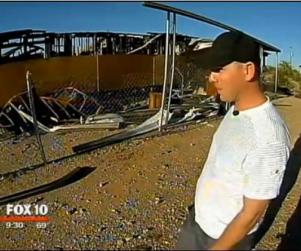A man’s house burned to the ground, but that wasn’t his only shock — because two weeks later, he received a bill for almost $20,000 from the private fire department that tried to fight it.
One state lawmaker says fire coverage in rural areas of Arizona is a mess and he says there needs to be oversight.
“Everything was completely gone,” said Justin Purcell.
Neighbors took video of Purcell’s home burning near 163rd Avenue and Dixileta in Surprise.
“You could actually feel the heat from the flame.. it was incredible,” said Kelly Miller.
Purcell and his wife were not staying in the home when it caught fire in August. They arrived later, only to watch firefighters douse hot spots.
“It’s definitely a shocker when you come back and your house is gone,” said Purcell.
But another perhaps bigger shocker was in the mail. Two weeks after the fire that gutted Purcell’s home, he got a bill from Rural Metro Fire Department for $19,825.
“Definitely was a surprise.. was a shocker when we got that,” said Purcell.
The bill was itemized.
“$1,500 a truck,” said Purcell.
The bill shows one truck stayed on scene for six hours, a second truck was there for four. Each truck included three firefighters.
“I think they were paying the firefighters $150 an hour and there were several of them,” said Purcell.
“Those numbers are set based on 65 years on tradition buying equipment, training, operating a fire service,” said Colin Williams, public information officer for Rural Metro.
Williams says the rates are fair.
Purcell lives in an unincorporated area that has no fire coverage. Williams says the bill includes Surprise firefighters who were first on the scene.
“In this case, firefighters responded, they did receive mutual aid from other departments.. once fire is knocked down and brought under control, Rural Metro units provide the overhaul and do essentially the mop up, if you will — that takes a significant amount of time and resources,” explained Williams.
We asked to look at the mutual aid agreement, but we’re told there isn’t one in writing.
“We do have what I call a gentleman’s agreement,” said Williams.
Surprise firefighters were on the scene within 13 minutes. It took Rural Metro 24 minutes to get there.
“They got here late and his house is totally gone. Then they’re going to charge him $20,000 and they let his house go. I don’t think that’s right at all,” said Brian Repp who lives nearby.
Residents living in the area pay a fire district assistance tax. The name alone implies it goes towards fire service in their area, but it doesn’t. It’s a county-wide tax to help fund volunteer fire districts.
The people in Purcell’s neighborhood have no fire coverage, but they say they didn’t know that until after Purcell’s house fire.
“Coincidentally, we all received a bill from Rural Metro fire informing us we have no fire coverage in our area, so they highly suggested we finally begin paying some fire coverage that we didn’t currently have,” said Miller.
Thinking they were already paying for fire coverage, residents were skeptical that Rural Metro, who just filed for bankruptcy, was trying to make a buck marketing their fire subscription.
“I can categorically reject that as it being somebody’s concern, however it’s in no way a means for us trying to generate revenue,” said Williams.
Admittedly, Rural Metro didn’t market the subscription to Purcell’s area until recently, because their closest fire station is 20 miles away.
“It’d take a significant amount of time for us to respond to that area,” said Williams.
Highlighted on the back of the subscription, it reads, “Response times will vary.” So with the options for people living here are: buy a yearly subscription, which is around $500 from Rural Metro for a service that is 20 miles away or take their chances and get a huge bill if their home burns. A third option is to form their own fire district. It can take months and ultimately a board will decide if they’ll contract out fire service or form a volunteer department.
“But it’s certainly something that needs to be addressed,” said Arizona State Senator Chester Crandell.
Crandell says there should be some guarantees when it comes to service and response times.
“There’s nobody regulating arrival times or anything like that,” he said.
Purcell had insurance on his home, but it doesn’t cover the Rural Metro bill.
“If there’s a service rendered, this service doesn’t come for free,” said Williams.
“When you do a service for someone, you usually tell them how much it’s going to cost before you do anything,” said Purcell.
Purcell says he would have gladly paid a yearly subscription fee had he known that was an option. With a newborn baby, the couple doesn’t know where they’re going to get the money from.
The cause of the fire has not yet been determined.
Rural Metro does have payment plans, but says it doesn’t give people the option to let their home burn.

